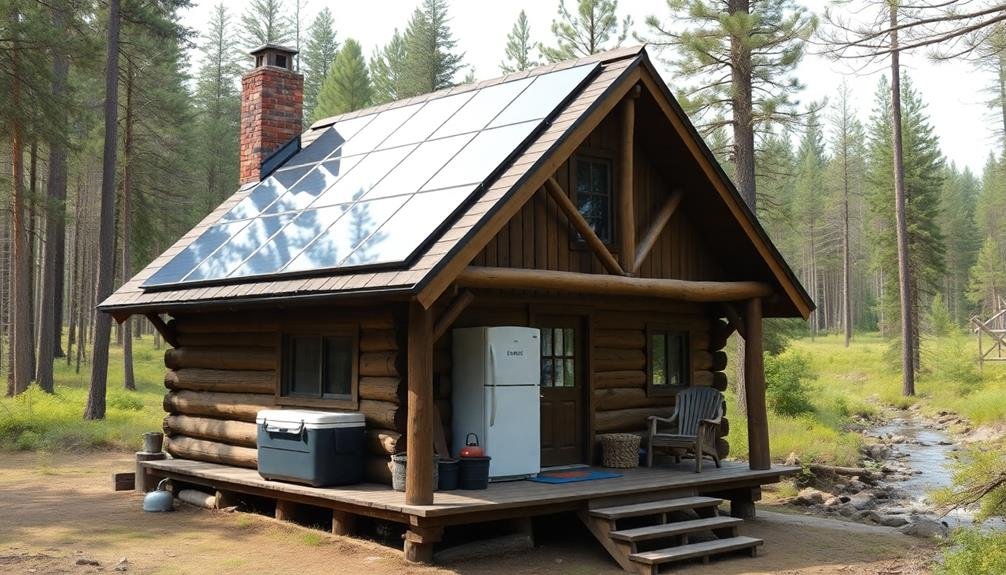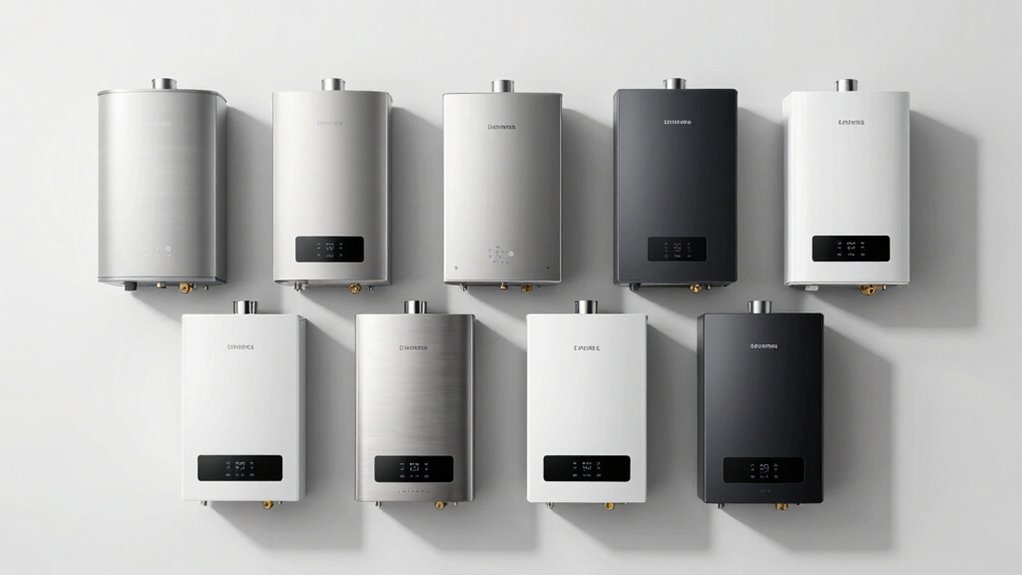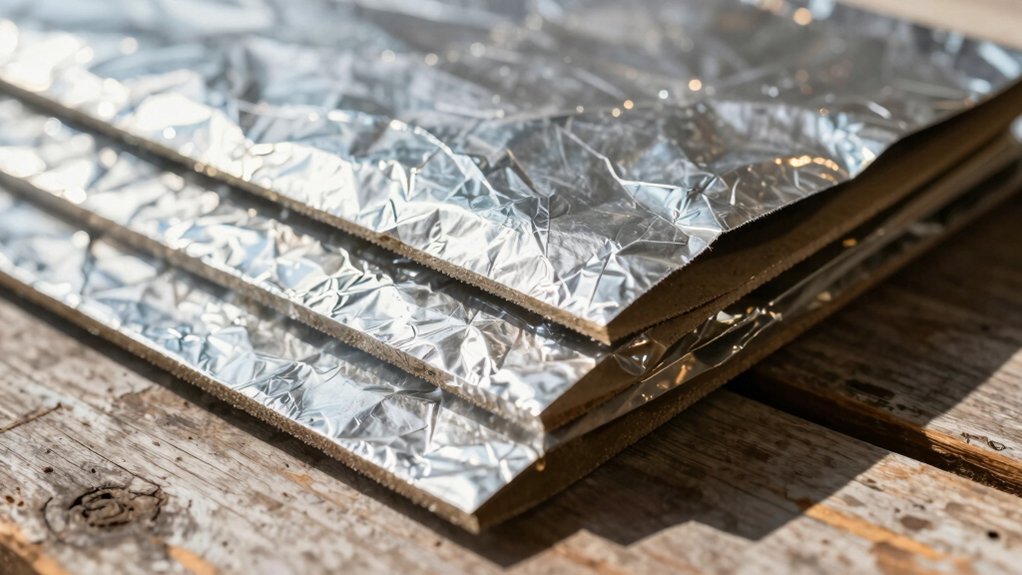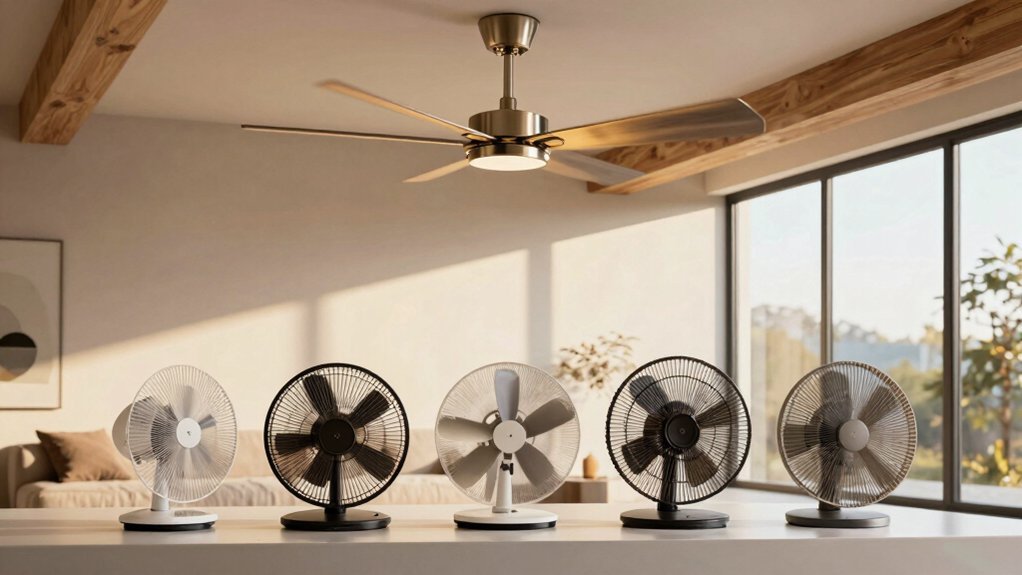When you're looking for off-grid refrigeration, you've got several great options. Solar-powered refrigerators offer eco-friendly cooling, while propane models provide reliable performance without electricity. For short trips, thermoelectric coolers and high-quality ice boxes can keep your food fresh. In hot, dry climates, evaporative cooling systems work wonders. Hybrid solar-battery fridges combine the best of both worlds, and Stirling engine refrigerators offer versatile cooling from various heat sources. Portable 12V refrigerators are perfect for vehicles and solar setups, while underground cooling systems tap into the earth's natural temperature regulation. Explore these solutions to find the perfect fit for your off-grid lifestyle.
Solar-Powered Refrigerators

Harnessing the sun's energy, solar-powered refrigerators offer a reliable off-grid cooling solution. These units typically consist of photovoltaic panels, batteries, and a DC-powered refrigerator. The panels convert sunlight into electricity, which is stored in batteries to power the fridge during cloudy days and at night.
You'll find various sizes and configurations available, from compact units ideal for RVs to larger models suitable for off-grid homes. Many solar fridges use efficient compressor technology, consuming less energy than traditional refrigerators. This efficiency allows them to operate effectively even with limited solar input.
When choosing a solar-powered refrigerator, consider your energy needs, available sunlight, and storage capacity. Look for models with adjustable temperature controls, good insulation, and durable construction to withstand off-grid conditions. Some units come with additional features like freezer compartments or ice makers.
It's essential to properly size your solar system to guarantee adequate power for your refrigerator. Factor in your location's solar potential and any other appliances you'll be running.
While initial costs can be higher than conventional fridges, solar-powered models offer long-term savings and independence from the grid.
Propane Refrigerators
You'll find propane refrigerators to be a reliable off-grid cooling solution that operates using heat from burning propane.
These units offer advantages like silent operation and independence from electrical grids, but they come with drawbacks such as ongoing fuel costs and potential safety concerns.
When considering propane refrigerators, you might explore popular models from brands like Dometic, Norcold, and Unique.
How Propane Refrigerators Work
While they may seem like a relic of the past, propane refrigerators remain a popular choice for off-grid living. These appliances operate on a unique principle called absorption refrigeration, which doesn't require electricity. Instead, they use heat from burning propane to drive the cooling process.
Here's how it works: A mixture of ammonia, water, and hydrogen circulates through the system. The propane flame heats this mixture, causing the ammonia to separate from the water and turn into a gas. As the ammonia gas cools, it condenses back into a liquid, absorbing heat from the refrigerator's interior. The hydrogen helps facilitate this process by lowering the ammonia's partial pressure.
You'll find that propane refrigerators are generally more energy-efficient than electric models, as they don't have a compressor. They're also quieter and have fewer moving parts, which means less maintenance.
However, they do require a steady supply of propane and proper ventilation for safety. While they may not offer the same features as modern electric refrigerators, propane models provide reliable cooling for your off-grid needs, making them an excellent choice for remote cabins, RVs, and boats.
Advantages and Disadvantages
Propane refrigerators offer a unique set of advantages and disadvantages for off-grid living.
On the plus side, they're incredibly reliable and can operate without electricity, making them ideal for remote locations. You'll find they're relatively low-maintenance and have a long lifespan, often lasting 15-20 years with proper care. They're also silent, which is a significant benefit in quiet, off-grid settings.
However, propane fridges do have drawbacks. They're less energy-efficient than electric models, consuming more fuel and potentially increasing your operating costs. You'll need to guarantee a steady supply of propane, which can be challenging in remote areas.
Safety is another concern, as propane is flammable and requires proper ventilation to prevent dangerous gas buildup. These refrigerators also tend to have smaller capacities than their electric counterparts, limiting your food storage options.
Additionally, they're typically more expensive upfront than conventional fridges. Finally, temperature control can be less precise, and you may need to manually defrost the freezer compartment periodically.
Despite these limitations, many off-grid dwellers find propane refrigerators to be a dependable and practical solution for their unique living situations.
Popular Propane Refrigerator Models
When choosing a propane refrigerator for your off-grid setup, several popular models stand out for their reliability and performance. These units offer efficient cooling without relying on electricity, making them ideal for remote locations or as backup options during power outages.
One of the most well-known brands in propane refrigeration is Dometic. Their DM2852RB model is a favorite among off-grid enthusiasts for its spacious interior and energy-efficient design. Another top contender is the Crystal Cold CC10, which boasts a compact size perfect for smaller spaces.
Here's a comparison of some popular propane refrigerator models:
| Model | Capacity (cu ft) | Price Range ($) | Energy Consumption (lbs/day) | Temp Range (°F) |
|---|---|---|---|---|
| Dometic DM2852RB | 8 | 1500-2000 | 1.5 | 32-43 |
| Crystal Cold CC10 | 10 | 1800-2300 | 1.3 | 33-45 |
| Unique UGP-10C | 10 | 1700-2200 | 1.4 | 34-46 |
| EZ Freeze EZ-10 | 10 | 1600-2100 | 1.6 | 33-44 |
| Smad XCD-300 | 11 | 2000-2500 | 1.7 | 32-45 |
When selecting a propane refrigerator, consider factors like size, energy efficiency, and temperature control to find the best fit for your off-grid needs.
Thermoelectric Coolers

Although less common than other off-grid cooling options, thermoelectric coolers offer a unique solution for those seeking portable refrigeration. These devices use the Peltier effect to create a temperature difference between two sides of the cooler, effectively cooling one side while heating the other.
You'll find thermoelectric coolers particularly useful for short trips or as supplementary cooling units. They're compact, lightweight, and don't require any refrigerants. Most models can run on 12V DC power, making them compatible with car batteries or solar panel systems.
However, thermoelectric coolers have limitations. They typically can't achieve temperatures as low as traditional refrigerators and are less energy-efficient. Their cooling capacity is also affected by ambient temperature, so they're best suited for moderate climates.
When choosing a thermoelectric cooler, consider its size, power consumption, and temperature range. Some models offer both cooling and heating functions, which can be handy for keeping food warm.
Look for units with good insulation and sturdy construction to maximize efficiency and durability.
While not ideal for long-term off-grid living, thermoelectric coolers can be a valuable addition to your outdoor adventures or emergency preparedness kit.
Ice Boxes and Coolers
For a more traditional and time-tested approach to off-grid refrigeration, ice boxes and coolers remain popular choices. These simple, portable solutions don't require electricity and can keep your food and drinks cold for days.
You'll find a variety of sizes and designs, from small personal coolers to large, rugged models suitable for extended camping trips.
When choosing an ice box or cooler, consider these key factors:
- Insulation quality
- Durability and construction
- Capacity and size
- Drain system and ease of cleaning
High-quality coolers with thick insulation can maintain ice for up to a week in ideal conditions. You'll need to replenish the ice periodically, but this method is reliable and cost-effective.
To maximize efficiency, pre-chill your cooler before use, pack it tightly, and minimize opening frequency.
For longer-term storage, you can combine ice boxes with other cooling methods. Use frozen water bottles or ice packs instead of loose ice to reduce mess.
Some models even feature built-in shelves or compartments to help organize your food and keep items dry. While not as convenient as powered refrigerators, ice boxes and coolers offer a dependable off-grid cooling solution for short to medium-term use.
Evaporative Cooling Systems

Evaporative cooling systems offer a unique approach to off-grid refrigeration that's both energy-efficient and environmentally friendly. These systems work by harnessing the natural cooling effect of water evaporation to lower the temperature of food storage areas.
You'll find two main types of evaporative coolers: direct and indirect. Direct coolers pass air through a wet pad, cooling it as the water evaporates. Indirect coolers use a heat exchanger to cool the air without adding moisture. Both types can effectively reduce temperatures by 10-30°F, depending on ambient conditions.
To use an evaporative cooler, you'll need a steady water supply and low humidity. They're most effective in hot, dry climates where humidity levels are below 50%. You can enhance their performance by placing them in shaded areas and ensuring proper ventilation.
One popular DIY option is the "Zeer pot," which consists of two nested clay pots with wet sand between them. This simple design can keep fruits and vegetables fresh for days without electricity.
For larger-scale cooling, you can build or purchase more elaborate systems with fans and pumps to circulate air and water.
Absorption Refrigerators
Absorption refrigerators offer a unique cooling solution for off-grid living, utilizing heat to drive the refrigeration cycle instead of a compressor.
You'll find these units available in both propane and electric models, giving you flexibility in power sources.
While they're known for their silent operation and longevity, you should consider their lower efficiency and slower cooling rates when compared to traditional compressor-based fridges.
How Absorption Refrigerators Work
Unlike conventional refrigerators that rely on compressors, absorption refrigerators operate using a unique heat-driven process. They use a mixture of ammonia, hydrogen gas, and water to create a cooling effect. When heat is applied to the generator, it separates the ammonia from the water. The ammonia vapor then moves through the system, absorbing heat and creating the cooling effect.
The main components of an absorption refrigerator include:
- Generator: Where heat is applied to separate ammonia from water
- Condenser: Cools and liquefies the ammonia vapor
- Evaporator: Where the cooling effect takes place
- Absorber: Combines ammonia and hydrogen gas with water
You'll find that absorption refrigerators are particularly useful in off-grid situations because they can run on various heat sources, such as propane, kerosene, or even solar thermal energy.
They're silent, have no moving parts, and require minimal maintenance. However, they're less efficient than compressor-based fridges and may struggle in extremely hot environments.
Despite these limitations, their ability to operate without electricity makes them a popular choice for RVs, boats, and remote cabins.
Propane vs. Electric Models
When choosing an absorption refrigerator for your off-grid setup, you'll need to decide between propane and electric models. Both options have their advantages and drawbacks, so consider your specific needs and resources.
Propane models are popular for off-grid use because they don't require electricity. They're ideal for remote locations without power access and can run continuously as long as you have a propane supply. However, you'll need to regularly refill or replace propane tanks, which can be inconvenient and costly over time.
Electric models, on the other hand, can be powered by solar panels or other renewable energy sources. They're more environmentally friendly and don't require fuel refills. However, they depend on a reliable power source, which may be challenging in cloudy conditions or during extended periods without sunlight.
Consider your location's climate, energy availability, and budget when making your choice. Propane models are often more affordable upfront but may have higher long-term operating costs.
Electric models typically have higher initial costs but can be more economical in the long run, especially if you have a robust renewable energy system in place.
Advantages and Disadvantages
Having evaluated the choice between propane and electric models, it's important to weigh the overall advantages and disadvantages of absorption refrigerators.
These units offer unique benefits for off-grid living, but they also come with some drawbacks you should be aware of.
Advantages of absorption refrigerators include:
- No moving parts, resulting in quiet operation and low maintenance
- Ability to run on multiple fuel sources (propane, electricity, or even solar)
- Long lifespan due to simple design
- Effective cooling in various climates and conditions
However, you'll need to examine some disadvantages.
Absorption refrigerators are generally less energy-efficient than compressor models, which means higher fuel consumption. They also tend to cool more slowly and may struggle to maintain consistent temperatures in extremely hot environments.
Additionally, these units are often more expensive upfront than traditional refrigerators.
Despite these drawbacks, many off-grid enthusiasts find that the benefits outweigh the cons.
The versatility and reliability of absorption refrigerators make them a popular choice for those seeking independence from the grid.
Ultimately, your decision will depend on your specific needs, budget, and off-grid setup.
Dc-Powered Refrigerators

Many DC-powered refrigerators offer an excellent solution for off-grid living. These units run directly on 12V or 24V power, making them ideal for solar, wind, or battery systems. You'll find they're more energy-efficient than traditional AC fridges, consuming less power and reducing strain on your off-grid setup.
DC refrigerators come in various sizes and styles, from compact units perfect for RVs to larger models suitable for off-grid homes. They often feature advanced insulation and efficient compressors, minimizing energy loss and maximizing cooling performance. Some models even include separate freezer compartments, giving you more versatility in food storage.
When choosing a DC fridge, consider its power consumption, storage capacity, and temperature control options. Look for models with adjustable thermostats and low-voltage disconnect features to protect your batteries. Many units also offer dual power capabilities, allowing you to switch between DC and AC power when available.
While DC refrigerators can be more expensive upfront, their long-term energy savings and reliability make them a worthwhile investment for off-grid living. They're designed to withstand the challenges of remote locations and provide consistent cooling without relying on traditional power sources.
Zeer Pot Cooling Method
Although less technologically advanced than DC refrigerators, the Zeer pot cooling method offers a simple, low-cost solution for off-grid refrigeration. This ancient technique uses evaporative cooling to keep food fresh without electricity. You'll need two clay pots of different sizes, sand, and water to create your own Zeer pot.
Here's how it works:
- Place the smaller pot inside the larger one.
- Fill the space between the pots with wet sand.
- Put your food in the inner pot and cover it with a damp cloth.
- Place the entire setup in a shaded, well-ventilated area.
As the water evaporates from the sand, it draws heat from the inner pot, cooling its contents. You'll need to add water to the sand regularly to maintain the cooling effect.
While not as efficient as modern refrigerators, Zeer pots can keep fruits, vegetables, and dairy products fresh for days or even weeks.
This method is particularly useful in hot, dry climates where electricity is scarce. It's an eco-friendly option that's easy to implement and maintain, making it ideal for small-scale food preservation in off-grid situations.
Thermal Mass Refrigeration

Thermal mass refrigeration harnesses the natural cooling properties of dense materials to maintain lower temperatures.
You'll find this method relies on substances like stone, concrete, or water to absorb and slowly release heat, creating a stable cooling environment.
While it's energy-efficient and low-maintenance, thermal mass refrigeration may not achieve as low temperatures as other methods and requires careful design for peak performance.
How It Works
A block of ice holds the key to understanding thermal mass refrigeration. This method relies on a large thermal mass, typically water or ice, to absorb heat and maintain a cool environment. When you place food items near this cold mass, they're cooled through conduction and convection.
Here's how thermal mass refrigeration works:
- Freezing: You'll need to freeze a large volume of water or another suitable thermal mass.
- Insulation: The frozen mass is placed in a well-insulated container to minimize heat transfer from the outside.
- Heat absorption: As the surrounding air warms, the thermal mass absorbs this heat, keeping the internal temperature low.
- Circulation: Natural convection currents or a small fan can help distribute the cool air evenly.
You'll find that thermal mass refrigeration is most effective when you're able to regularly refreeze the thermal mass. This can be done using solar power, propane, or even natural ice harvested during winter.
The system's efficiency depends on the quality of insulation, the size of the thermal mass, and the ambient temperature. While it may not be as convenient as a conventional refrigerator, it's an excellent off-grid solution for keeping food cool without electricity.
Pros and Cons
When considering thermal mass refrigeration, it's important to weigh its advantages and drawbacks. This off-grid solution offers several benefits, including low maintenance requirements and zero energy consumption. You'll appreciate its simplicity and reliability, especially in remote locations where power sources are scarce.
However, thermal mass refrigeration also has limitations. It doesn't provide as cold a temperature as electric refrigerators, which may affect food storage duration. You'll need to plan carefully and use this method primarily for short-term cooling needs.
| Pros | Cons | Considerations |
|---|---|---|
| No energy required | Limited cooling capacity | Best for short-term use |
| Low maintenance | Not suitable for freezing | Requires proper insulation |
| Eco-friendly | Dependent on ice availability | Size limitations |
To maximize the effectiveness of thermal mass refrigeration, you'll need to guarantee proper insulation and regularly replenish the ice or cold materials. It's an excellent option for camping trips, emergency preparedness, or supplementing your primary refrigeration system. By understanding its strengths and weaknesses, you can determine if thermal mass refrigeration is the right off-grid solution for your specific needs.
Hybrid Solar-Battery Refrigerators
Combining the best of both worlds, hybrid solar-battery refrigerators offer a reliable off-grid cooling solution. These systems use solar panels to power the refrigerator during daylight hours and store excess energy in batteries for nighttime or cloudy days.
You'll benefit from the continuous operation and energy efficiency of these units, making them ideal for remote locations or areas with unreliable grid power.
When considering a hybrid solar-battery refrigerator, keep these key points in mind:
- Capacity: Choose a size that meets your storage needs without overextending your power resources.
- Energy efficiency: Look for models with high-efficiency ratings to maximize your solar power usage.
- Battery life: Opt for high-quality, long-lasting batteries to guarantee consistent performance.
- Climate adaptability: Select a unit designed to withstand your local weather conditions.
You'll find that hybrid solar-battery refrigerators require minimal maintenance and offer significant long-term cost savings.
They're environmentally friendly and reduce your carbon footprint by utilizing renewable energy. While the initial investment may be higher than traditional refrigerators, you'll appreciate the independence and reliability these systems provide in off-grid situations.
With proper sizing and installation, you can enjoy consistent refrigeration without relying on fossil fuels or grid power.
Stirling Engine Refrigerators

Stirling engine refrigerators offer a unique and efficient cooling solution for off-grid living. These devices use a closed-cycle heat engine to generate cooling power, making them ideal for remote locations where electricity is scarce.
You'll find that Stirling engine refrigerators are highly reliable and can run on various heat sources, including solar thermal, biomass, or even waste heat from other processes. They don't require electricity, which sets them apart from traditional compressor-based refrigerators. This makes them particularly useful in areas with limited or no access to the power grid.
These refrigerators are known for their low noise levels and minimal maintenance requirements. They've fewer moving parts than conventional refrigerators, reducing the likelihood of breakdowns. You'll appreciate their long lifespan and durability, especially in harsh environments.
While Stirling engine refrigerators can be more expensive upfront, they often prove cost-effective in the long run due to their energy efficiency and low operating costs.
You'll need to evaluate factors like size, cooling capacity, and heat source availability when choosing a Stirling engine refrigerator for your off-grid setup.
Portable 12V Refrigerators
Embracing the convenience of portable 12V refrigerators can revolutionize your off-grid living experience. These compact units are designed to run on 12-volt DC power, making them ideal for use with solar panels, batteries, or your vehicle's electrical system.
They're perfect for RVs, boats, cabins, and camping trips, offering reliable cooling without the need for ice or propane. Unlike traditional coolers, 12V refrigerators maintain a consistent temperature, ensuring your food stays fresh for longer periods.
They're energy-efficient, consuming minimal power to operate. Most models feature adjustable temperature controls, allowing you to customize cooling based on your needs.
When choosing a portable 12V refrigerator, consider:
- Capacity – Determine how much storage space you'll need
- Power consumption – Look for energy-efficient models to maximize battery life
- Durability – Opt for rugged construction to withstand outdoor use
- Additional features – Some units offer dual-zone cooling or freezer capabilities
You'll find various sizes and designs available, from small, single-compartment units to larger, dual-zone models that can accommodate both refrigeration and freezing needs.
With a 12V refrigerator, you can enjoy fresh food and cold drinks anywhere, enhancing your off-grid lifestyle without compromising on comfort.
Underground Cooling Systems

Underground cooling systems offer a natural and energy-efficient approach to off-grid refrigeration. These systems utilize the earth's constant temperature below the frost line to maintain a cool environment for food storage. You can create a simple root cellar by digging into a hillside or burying a container in the ground.
To build an underground cooling system, you'll need to choose a well-drained location and excavate to a depth of at least 4 feet. Line the walls with insulation and install shelving for food storage. Guarantee proper ventilation to prevent moisture buildup and mold growth.
You can enhance cooling by incorporating a thermal mass, such as stone or concrete, which absorbs heat during the day and releases it at night.
For a more advanced system, consider installing earth tubes. These pipes run underground and use the earth's temperature to cool incoming air before circulating it through your storage area. You can also add a small solar-powered fan to improve air circulation and maintain consistent temperatures.
With proper design and maintenance, underground cooling systems can provide reliable, low-cost refrigeration for your off-grid needs.
Frequently Asked Questions
How Do Off-Grid Refrigeration Solutions Compare in Terms of Long-Term Cost Efficiency?
You'll find that solar-powered refrigerators offer the best long-term cost efficiency among off-grid solutions. They've got lower operating costs and longer lifespans compared to propane or battery-powered options, despite higher initial investments.
What Are the Environmental Impacts of Different Off-Grid Refrigeration Methods?
You'll find that solar-powered fridges have the lowest environmental impact. Propane models emit greenhouse gases, while thermoelectric coolers can strain your battery system. Absorption refrigerators are eco-friendly but less efficient. Always consider your specific needs and local conditions.
Can Off-Grid Refrigeration Systems Be Integrated With Existing Renewable Energy Setups?
You can easily integrate off-grid refrigeration systems with your existing renewable energy setup. Whether you're using solar panels, wind turbines, or micro-hydro, there are compatible refrigeration options that'll work seamlessly with your current sustainable power source.
Are There Any Government Incentives for Adopting Off-Grid Refrigeration Solutions?
You'll find various government incentives for off-grid refrigeration solutions. These can include tax credits, rebates, and grants. Check with your local and federal energy departments to discover available programs that could save you money on your purchase.
How Do Off-Grid Refrigerators Perform in Extreme Weather Conditions?
Your off-grid refrigerator's performance in extreme weather depends on its design and insulation. You'll find that well-built models can maintain temperature even in harsh conditions, but you'll need to guarantee proper ventilation and protection from direct sunlight.
In Summary
You've explored a range of off-grid refrigeration options, from solar-powered units to underground cooling systems. Each solution has its pros and cons, so choose based on your specific needs, climate, and energy availability. Don't forget to contemplate factors like capacity, energy efficiency, and maintenance requirements. With the right choice, you'll keep your food fresh and drinks cold, even when you're far from the power grid. Stay cool and enjoy your off-grid adventures!





Leave a Reply